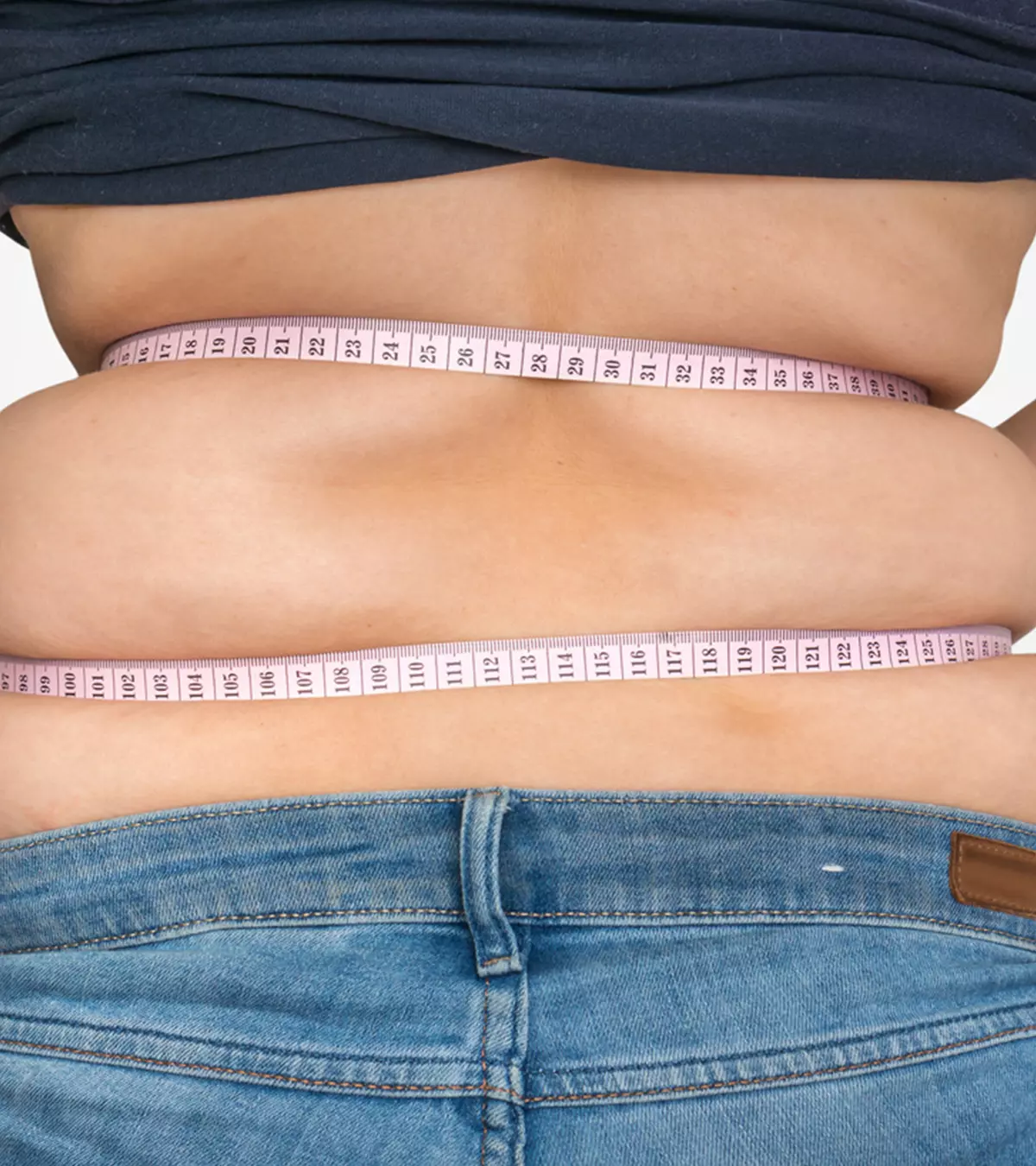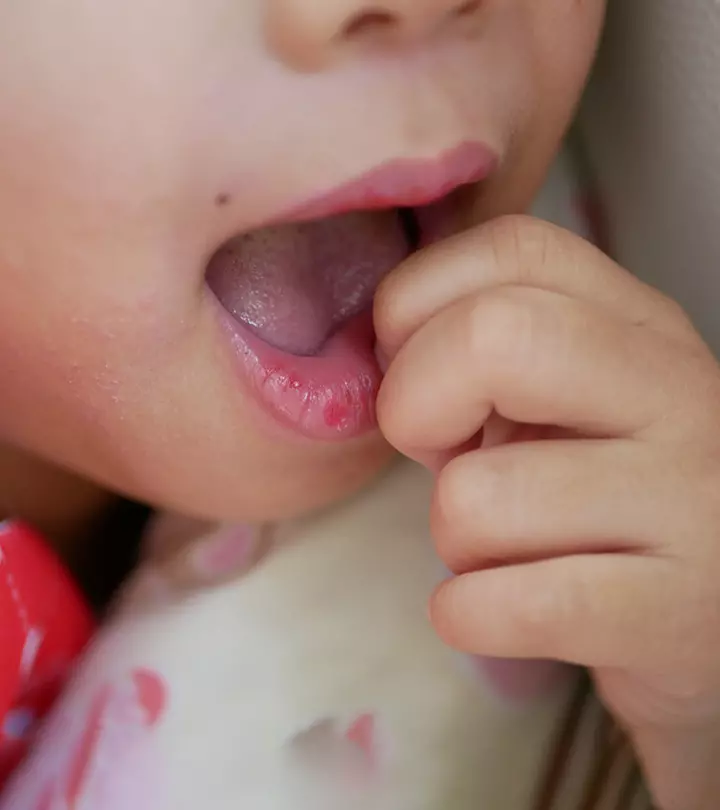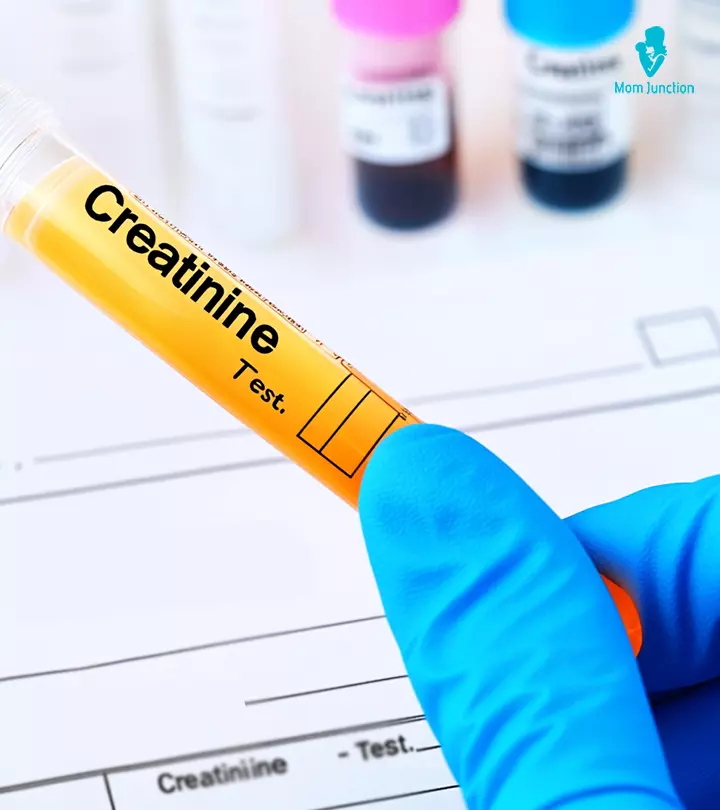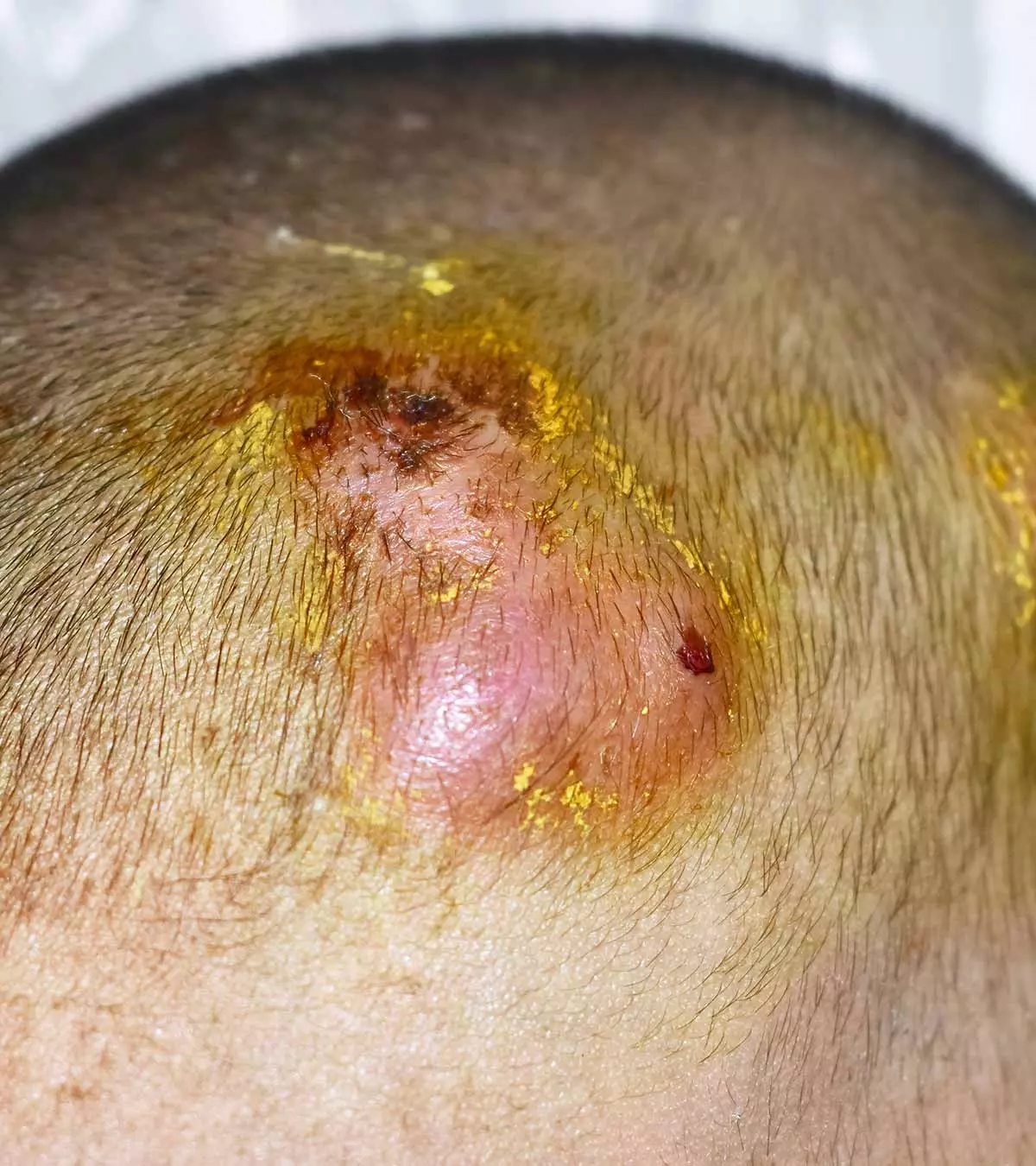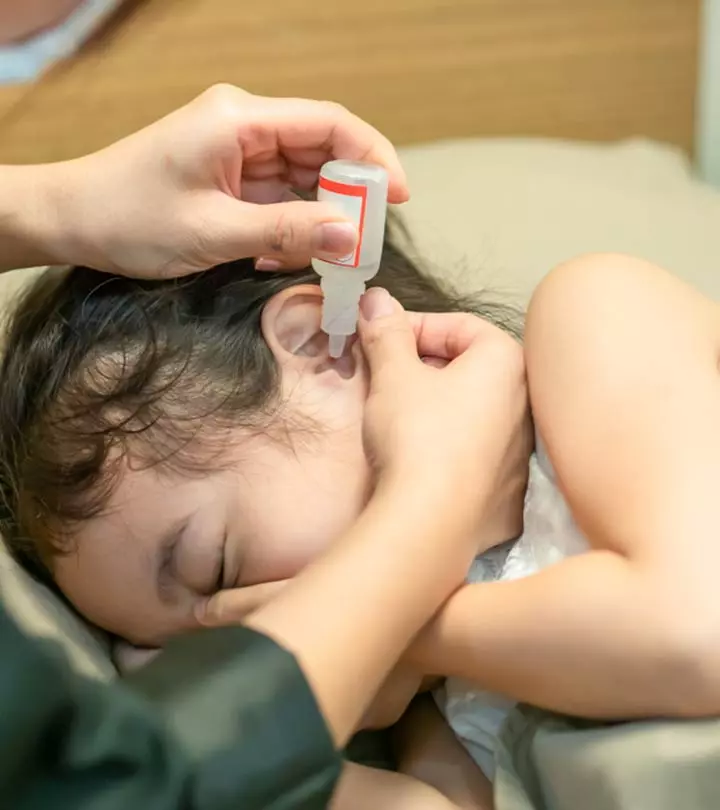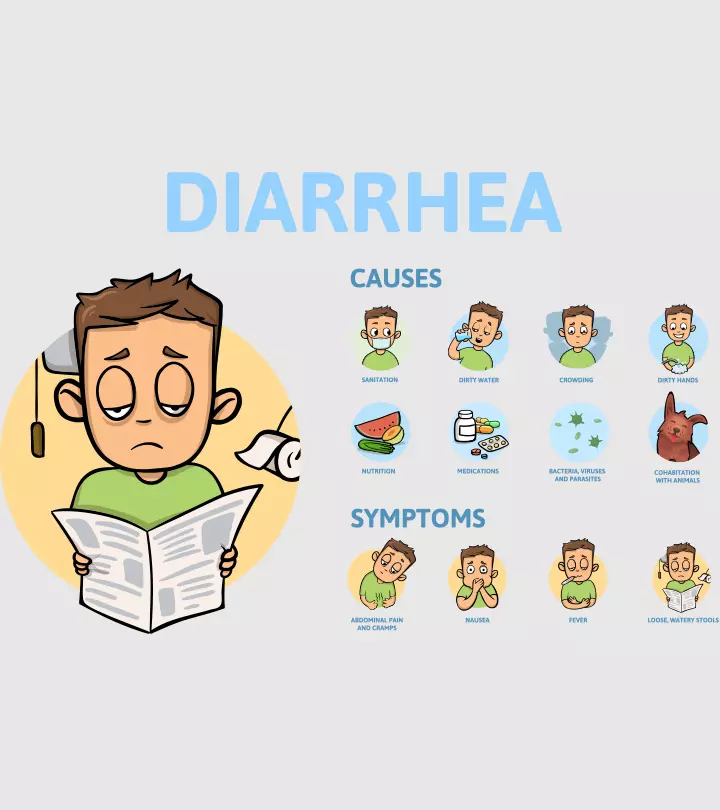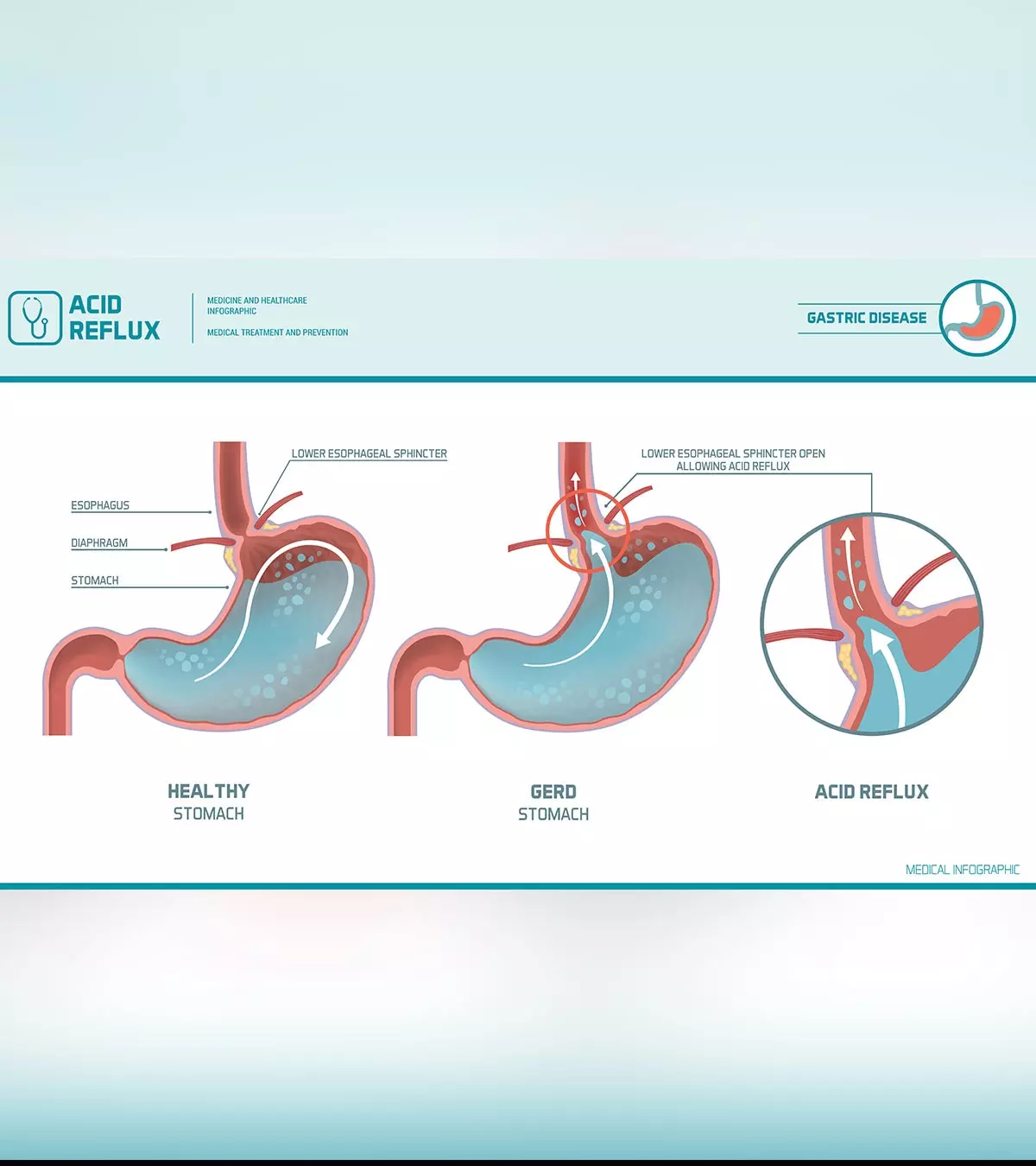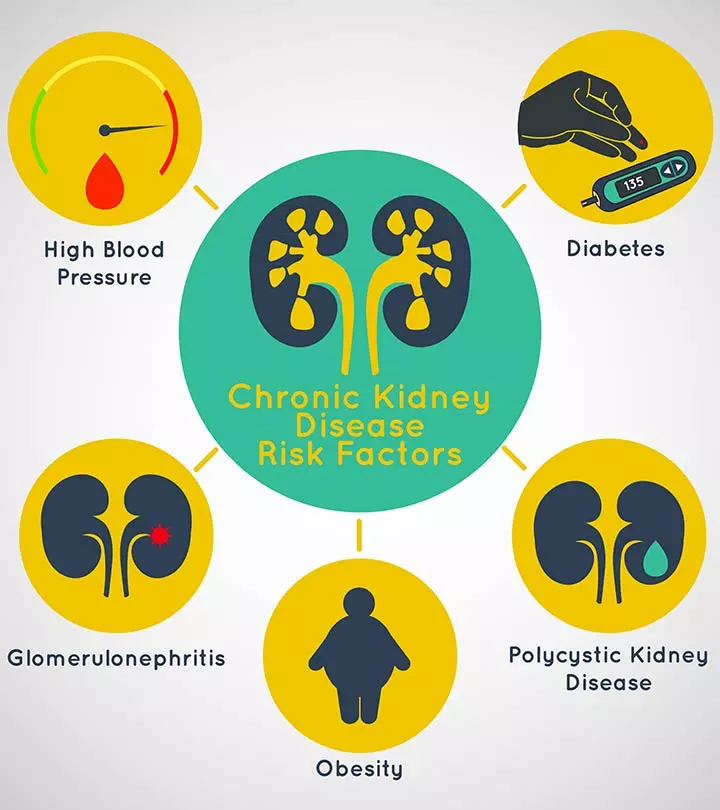
Image: Shutterstock
Kidneys are bean-shaped organs that control water levels and eliminate waste products through urine. Kidney diseases in children can be acute (sudden) or chronic (permanent), and the outcomes may vary accordingly. These conditions affect the function and structure of the kidneys, impairing their ability to filter waste from the blood and produce urine Genetic kidney diseases are more prevalent in children than adults. Most of these diseases are diagnosed during prenatal testing and require medical or surgical treatment. Other kidney issues, such as urinary tract infections (UTI), may occur later in life (1) (2).

Read on to learn about the types, causes, risk factors, symptoms, and treatment of kidney diseases in children.
Key Pointers
- Kidney disease is twice as common in boys as in girls.
- Fetal hydronephrosis, polycystic kidney disease, glomerulonephritis, and nephrotic syndrome are a few examples of pediatric kidney disease.
- Kidney disease may develop in children born with congenital defects such as an ectopic kidney, renal agenesis, or renal dysplasia.
- Treatment for kidney disease in children varies depending on the disease etiology and severity.
How Common Is Kidney Disease In Children?

Around one or two in every 100,000 children under the age of 19 can develop kidney failure. African American teenagers are thrice more likely to develop kidney failure than Caucasians of the same age. Moreover, boys are twice as likely to develop kidney disease as girls (3).
What Are The Types Of Kidney Disease In Children?
Kidney diseases that develop from birth are (1):
- Posterior urethral valve obstruction:It is an obstruction or narrowing of the urethra. The disease occurs mostly in boys and can be treated with surgery after birth.
- Fetal hydronephrosis: One or both kidneys are enlarged because of the obstruction in the developing urinary tract, or when the urine flows backward from the bladder into the ureters (vesicoureteral reflux). This type of hydronephrosis in babies is diagnosed before birth and may sometimes be treated with surgery.
- Polycystic kidney disease:Polycystic kidney disease is mainly inherited and can be diagnosed before or after the child is born. Fluid-filled cysts develop in the kidneys and multiply, leading to kidney failure. The disease requires dietary changes as a supportive measure, and in most cases, a kidney transplant or dialysis is needed.
- Multicystic kidney disease: Large cysts develop in one of the kidneys that have not formed properly. The affected kidney eventually stops working; however, children with this disease can lead a normal life with the other healthy kidney. It can be diagnosed before birth, and surgery is needed only in rare cases.
 Quick fact
Quick fact- Renal tubular acidosis: The disease occurs when the kidneys cannot remove acids from the blood. It can affect a child’s growth and cause kidney stones and bone disease. Immediate treatment is important for the prevention of these complications.
- Wilms Tumor: Wilms Tumor, also known as nephroblastoma, is a rare and treatable kidney cancer. As stated in the National Cancer Institute, for children below 20 years with Wilms tumor, the five-year relative survival rate is 93%. Children with this disease can lead a normal life after treatment. In some cases, the tumor is believed to grow with the fetus in the womb.
- Glomerulonephritis: Glomerulonephritis is a condition where the kidneys are unable to clean the blood. As a result, children experience swelling in the body or difficulty with urinating. If left untreated, the disease may lead to kidney failure. Dietary changes and medicines are used to treat the condition.
- Nephrotic syndrome: Nephrotic syndrome occurs because of the damage in the blood vessels of the kidneys. In this condition, kidneys pass excess protein in the urine.

Sometimes, the baby’s urinary tract does not develop properly in the womb, leading to kidney problems. These congenital problems are:
- Duplication of the ureters, in which a kidney has two ureters rather than one. This condition can cause urinary tract infections and can be treated with surgery.
- Horseshoe kidney, in which two kidneys are fused into one arched kidney. It functions normally but needs to be regularly checked by healthcare providers. It might need surgical intervention.
Other problems associated with kidneys:
Sometimes, other health conditions in children might prevent the kidneys from functioning normally. They include:
- Hypertension (high blood pressure)
- Kidney stones
- Nephritis (inflammation of the kidneys caused by infection or autoimmune disease)
- Urinary tract infections (UTIs) (bacteria enter the bladder or kidneys)
 Caution
CautionWhat Are The Causes And Risk Factors Of Kidney Disease In Children?
Several factors can increase the risk of kidney disease in children.
Acute kidney disease
- Reduced blood flow in kidneys due to surgery, dehydration, blood loss, or shock
- Blockage in the urinary tract
- Medications that cause kidney problems
- Conditions such as cardiac arrest slow down or block the oxygen and blood flow into the kidneys
- Hemolytic uremic syndrome is caused by E.coli infection, where it leads to kidney failure because of blocked small blood vessels and structures (4)
Chronic kidney disease
- Blockage in the urinary tract for a long period
- Alport syndrome (an inherited disorder that causes deafness, eye problems, and kidney damage).
- Cystinosis (an inherited disorder where amino acid called cystine accumulates in the kidneys).
- Untreated acute kidney disease may also turn chronic if not treated on time.
- Other conditions include untreated diabetes, hypertension, chronic urinary tract infection, and lupus (4).
Apart from these factors, kidney disease in children can also occur from birth defects. These defects occur while the baby is growing in the mother’s womb. The common birth defects are (5):
- Babies born with a single kidney (renal agenesis)
- Babies born with two kidneys, one of which does not function (renal dysplasia)
- Babies born with dislocated kidneys (ectopic kidney)
Most children born with these birth defects do not face any major problems; however, it is important to contact a pediatrician/child nephrologist.
What Are The Symptoms Of Kidney Disease In Children?
The symptoms of acute and chronic kidney disease may differ from each other.
Some common symptoms of acute kidney disease are (4) (6):
- Fever
- Rash
- Hematuria (blood in urine)

Some common symptoms of chronic kidney disease are (2) (4) (6):
- Chronic nausea and vomiting
- Bone pain
- Poor appetite
- High blood pressure
- Poor growth
- No urine or excess urine
- Frequent UTIs
- Urinary incontinence
- Pale skin
- Mass in the stomach
- Hearing impairment
- Bad breath
- Swollen tissues
- Irritable behavior
- Change in alertness
- Poor muscle tone
- Weakness and fatigue
- Change in the urine color, indicating blood
- Extra foam formation in urine, indicating protein
What Are The Complications Of Kidney Disease?
Kidney disease or failure may lead to several complications as follows (4):
- Anemia (low level of red blood cells in the body)
- Heart problems
- Bone disease
- Bone, joint and muscle pain
- Improper mental function, leading to confusion, less concentration, and dementia
- Nerve damage in upper and lower limbs
- Highly prone to infections
- Poor nutrition
- Dry and itchy skin
How Is Kidney Disease Diagnosed In Children?
If healthcare providers suspect the child has kidney disease, they will start with a medical history and physical examination. Then, further diagnostic tests are done to confirm the disease (1) (4) (3) (7) :
- Blood tests: A blood sample is examined to check the kidney function (amount of blood the kidney filters in a minute), blood cell count, and electrolyte levels.
- Urine test (Urinalysis): This helps detect abnormal functioning of the kidneys. The test indicates inflammation in the urinary tract and detects excess white cells caused due to infection.
- Renal ultrasound: This is an imaging test that enables doctors to see the shape and size of the kidneys. The test also helps to examine the presence of cysts, stones, or any other growth in the kidneys.

- Kidney biopsy: In this procedure, a small sample of the kidney tissue is taken with the needle and examined in the lab. It helps to accurately understand the functioning of the kidney and the extent of the damage.
- Bone scan: This nuclear imaging method helps examine the signs of bone diseases, tumors, or inflammation.
- Chest X-ray: This test enables doctors to understand the functioning of the lungs and heart.
- Electrocardiogram: This test enables doctors to understand the heart’s functioning and rule out any chance of heart tissue damage.
How Is Kidney Disease Treated In Children?
The treatment of kidney disease in children depends on the cause and severity of the disease.
The treatment for acute kidney disease might include (4):
- Hospital admission
- Intravenous fluid administration to replenish the fluid loss
- Diuretics to increase the amount of urine
- Tracking electrolyte levels in the body
- Medicines to control blood pressure
- Dietary changes
The treatment for chronic kidney disease includes (4):
- Medicines to address bone problems and anemia
- Dietary changes
- Dialysis
- Kidney transplant (removing the damaged kidney and replacing it with a new one). Renal transplantation is the preferred treatment for end-stage renal disease (ESRD) in children (8).
 Did you know?
Did you know?Some specific treatments for the causes leading to kidney diseases are (3):
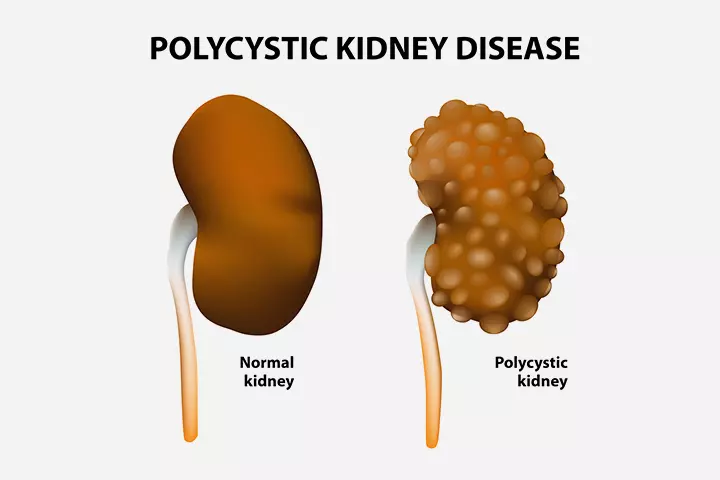
- Birth defects: Treatment is generally not required for children with kidney disease due to birth defects. Doctors continue to observe the patients over a period and might perform surgery if there is a blockage or damage to the kidney.
- Hereditary diseases: Children with polycystic kidney disease are given antibiotics to fight urinary tract infections and other complications.
- Infections: Children with hemolytic uremic syndrome need to maintain their electrolyte and fluid levels. In some cases, they may also need a red blood cell transfusion. Some children need dialysis for a short period, while most children recover after the treatment.
- Trauma: If children have kidney disease due to trauma, they are first treated for trauma. They may also require dialysis for a short time until the kidney function resumes.
- Urine blockage: Mostly, the blockage resolves on its own. If the blockage continues, surgery is performed to remove it.
Ensure regular check-ups to help manage kidney disease in children.
Dietary Changes During Kidney Treatment
In the course of kidney treatment, diet plays an important role. Some dietary changes your child might need to make in the diet are (4):
- Reduce the protein intake because the kidneys may not efficiently eliminate the excess protein.
- Limit food containing potassium because the excess potassium may accumulate in the blood (hyperkalemia), which can be life-threatening (9).
- Avoid phosphorus-containing foods because extra phosphorus can cause calcium to leave the bones.
- A low-sodium diet helps reduce fluid retention in the body.
If left untreated, kidney disease in children could lead to complications. However, with the right treatment and management strategies, pediatric kidney disease can be effectively managed. Thus, if you notice any signs of kidney disease in your child, contact a nephrology specialist right away for an accurate diagnosis. Further, ensure your child is in safe surroundings once the diagnosis is confirmed. Inform your child about their medical condition, treatment options, and the diet modification they should maintain. This is also a difficult time for parents; however, sharing your feelings with others can help you cope.
Frequently Asked Questions
1. Is kidney disease curable in children?
The treatment for kidney disease in children depends on its cause. Chronic kidney diseases and hereditary ones, such as polycystic kidney disease (PKD), can’t be cured (3). However, prompt diagnosis and treatment can help relieve the symptoms.
2. At what age does kidney disease in children usually start?
There’s no fixed age by which kidney disease occurs in children. Some kidney diseases, such as posterior urethral valve obstruction and polycystic kidney disease (PKD), are present from birth (1). Alternatively, kidney diseases caused by trauma and infection can occur at any age.
3. Can kidney problems be life-threatening?
According to the National Institute of Health, “kidney disease can affect children in various ways, ranging from treatable disorders without long-term consequences to life-threatening conditions (3).”
Infographic: How Does Chronic Kidney Disease (CKD) Or Kidney Failure Affect Children?
Chronic kidney diseases or kidney failure can affect a child’s physical and mental development. Sometimes, loss of bladder control causing accidental urination, restriction in activities, or need for long-term medical treatments can cause emotional trouble in children. Go through the infographic to know the challenges in children with kidney failure or CKD to address them on time.
Some thing wrong with infographic shortcode. please verify shortcode syntax
Some thing wrong with illustration image shortcode. please verify shortcode syntax
This video will explore the causes and effects of kidney disease in children. Learn how to recognize the signs and how to help your child manage the condition.
References
- Kidney Diseases in Childhood.
https://kidshealth.org/en/parents/kidney-diseases-childhood.html - Symptoms of Pediatric Kidney Disease.
https://www.dpcedcenter.org/what-is-kidney-disease/pediatric-kidney-disease/symptoms/ - Kidney Disease in Children.
https://www.niddk.nih.gov/health-information/kidney-disease/children#treatment - Kidney Disease in Children.
https://www.urmc.rochester.edu/encyclopedia/content?ContentTypeID=90&ContentID=P03111 - Causes of kidney disease in children.
https://www.kidneyfund.org/all-about-kidneys/kidney-disease-children/causes-kidney-disease-children - Chronic Kidney Disease in Children.
https://www.healthychildren.org/English/health-issues/conditions/genitourinary-tract/Pages/Chronic-Kidney-Disease-in-Children.aspx
- Renal Failure in Children.
https://www.chop.edu/conditions-diseases/renal-failure-children - Facts About High Potassium in Patients with Kidney Disease.
https://www.kidney.org/kidney-topics/hyperkalemia-high-potassium - Kidney Cysts in Infants, Children & Teens.
https://www.healthychildren.org/English/health-issues/conditions/genitourinary-tract/Pages/Kidney-Cysts-in-Infants-Children-Teens.aspx - Kidney Disease: The Basics
https://www.kidney.org/about/kidney-disease-fact-sheet#downloadable-pdf
Community Experiences
Join the conversation and become a part of our nurturing community! Share your stories, experiences, and insights to connect with fellow parents.
Read full bio of Dr. Garima Garg Seth
Read full bio of Pragya Bhargavi
Read full bio of Dr. Ritika Shah
Read full bio of Dr. Joyani Das







